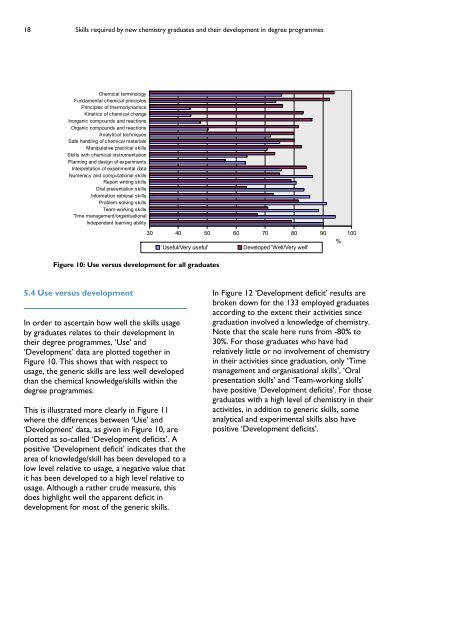Skills required by new chemistry graduates - Higher Education ...
Skills required by new chemistry graduates - Higher Education ...
Skills required by new chemistry graduates - Higher Education ...
Create successful ePaper yourself
Turn your PDF publications into a flip-book with our unique Google optimized e-Paper software.
18 <strong>Skills</strong> <strong>required</strong> <strong>by</strong> <strong>new</strong> <strong>chemistry</strong> <strong>graduates</strong> and their development in degree programmes<br />
Chemical terminology<br />
Fundamental chemical principles<br />
Principles of thermodynamics<br />
Kinetics of chemical change<br />
Inorganic compounds and reactions<br />
Organic compounds and reactions<br />
Analytical techniques<br />
Safe handling of chemical materials<br />
Manipulative practical skills<br />
<strong>Skills</strong> with chemical instrumentation<br />
Planning and design of experiments<br />
Interpretation of experimental data<br />
Numeracy and computational skills<br />
Report writing skills<br />
Oral presentation skills<br />
Information retrieval skills<br />
Problemsolving skills<br />
Teamworking skills<br />
Time management/organisational<br />
Independent learning ability<br />
Figure 10: Use versus development for all <strong>graduates</strong><br />
30 40 50 60 70 80 90 100<br />
%<br />
'Useful/Very useful'<br />
Developed 'Well/Very well'<br />
5.4 Use versus development<br />
In order to ascertain how well the skills usage<br />
<strong>by</strong> <strong>graduates</strong> relates to their development in<br />
their degree programmes, ‘Use’ and<br />
‘Development’ data are plotted together in<br />
Figure 10. This shows that with respect to<br />
usage, the generic skills are less well developed<br />
than the chemical knowledge/skills within the<br />
degree programmes.<br />
This is illustrated more clearly in Figure 11<br />
where the differences between ‘Use’ and<br />
‘Development’ data, as given in Figure 10, are<br />
plotted as so-called ‘Development deficits’. A<br />
positive ‘Development deficit’ indicates that the<br />
area of knowledge/skill has been developed to a<br />
low level relative to usage, a negative value that<br />
it has been developed to a high level relative to<br />
usage. Although a rather crude measure, this<br />
does highlight well the apparent deficit in<br />
development for most of the generic skills.<br />
In Figure 12 ‘Development deficit’ results are<br />
broken down for the 133 employed <strong>graduates</strong><br />
according to the extent their activities since<br />
graduation involved a knowledge of <strong>chemistry</strong>.<br />
Note that the scale here runs from -80% to<br />
30%. For those <strong>graduates</strong> who have had<br />
relatively little or no involvement of <strong>chemistry</strong><br />
in their activities since graduation, only ‘Time<br />
management and organisational skills’, ‘Oral<br />
presentation skills’ and ‘Team-working skills’<br />
have positive ‘Development deficits’. For those<br />
<strong>graduates</strong> with a high level of <strong>chemistry</strong> in their<br />
activities, in addition to generic skills, some<br />
analytical and experimental skills also have<br />
positive ‘Development deficits’.
















